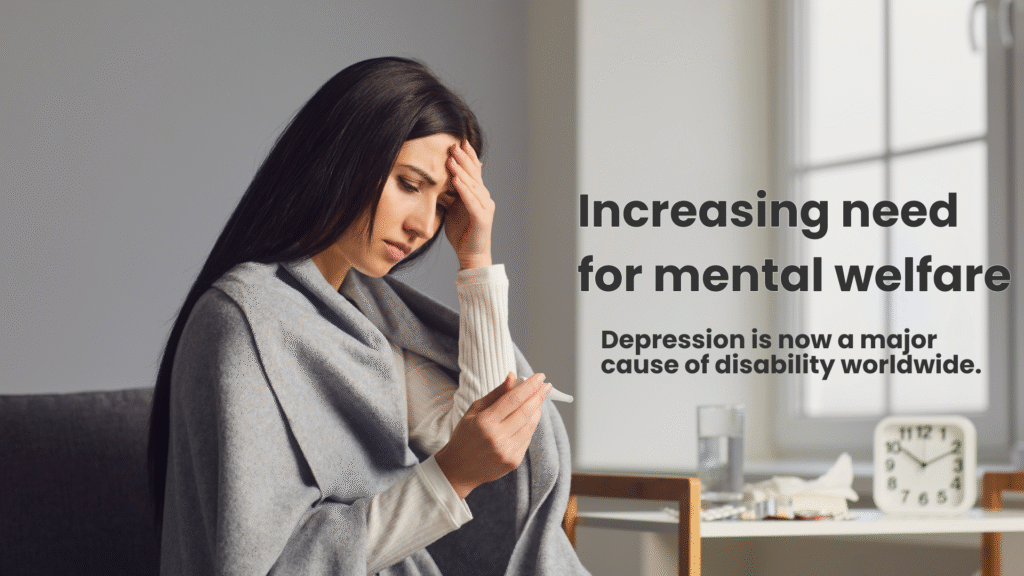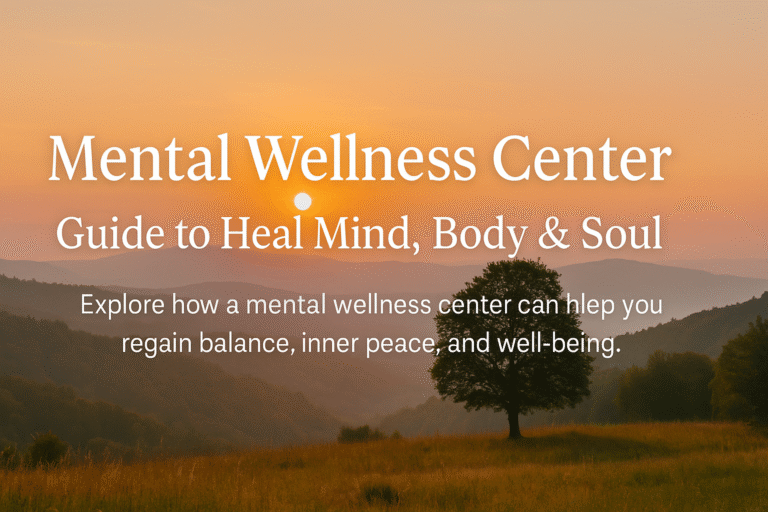In today’s fast-paced, high-pressure world, mental welfare has become as important as physical health. Stress, anxiety, depression, and emotional burnout have become common concerns for millions of people. Among these challenges, mental wellness centers have emerged as safe spaces designed to help individuals balance, create flexibility, and live emotionally healthy lives.
But what is a mental welfare center? Which services does it offer? Who needs it? How do you choose the right one? In this intensive guide, we will answer all these questions and find out how a mental welfare center can change your life.
What is a mental welfare center?
A mental wellness center is a feature that offers several services to the aim of improving mental, emotional, and sometimes spiritual health. These centers are employees with qualified professionals such as psychologists, physicians, consultants, life coaches, and overall health experts.
Unlike traditional mental health clinics, which often focus on diagnosis and drug treatment, mental welfare centers usually adopt a holistic approach to promote welfare for a time, including healing, lifestyle intervention, and enhancing self-determination practices to promote welfare.
Increasing need for mental welfare
Mental health figures worldwide indicate a growing crisis:
- More than 1 billion people suffer from this mental health or substance use disorder.
- Depression is now a major cause of disability worldwide.
- The 2nd major cause of death among children from 15 to 29 is suicide.
Modern life, technology, being overweight, lack of community support, and financial pressure are the main contributors. This has made mental welfare centers more important than ever.

Core Services Offered by Mental Wellness Centers
Different centers may have different specialties, but most mental wellness centers provide the following core services:
1. Individual counseling and medical
It contains a session with licensed psychologists or a physician, which is to solve personal challenges such as anxiety, depression, trauma, sorrow, or low self-esteem.
2. Group medical session
Group therapy provides a place where individuals can share their experiences and get perspectives. It is effective for people dealing with addiction, PTSD, or social anxiety.
3. Family and counseling
Family mobility or relationship problems can greatly affect mental welfare.
4. Cognitive behavior therapy
it is the most important evidence-based approach to change negative thinking patterns and behavior. Many centers provide it as the main treatment option.
5. Mindfulness and Meditation Training
Stress management techniques such as meditation, yoga, and deep breathing exercises are often included in welfare programs to restore calm and clarity.
6. Life coaching and goal setting
Some centers provide individuals with individual development and coaching services to achieve goals, improve productivity, and lead a purpose-operated life.
7. Nutrition and lifestyle consultation
A healthy body supports a healthy mind. Some Centers have nutrition and fitness experts to guide customers towards healthy habits.
8. Rehabilitation and addiction support
Many mental wellness centers also serve as a recovery center for individuals struggling with drug abuse, providing detox programs, therapy and aftercare.
Types of Mental Wellness Centers
Different people have different needs, and mental wellness centers cater to various demographics and challenges:
Outpatient Mental Wellness Centers
Designed for individuals who require regular support but do not need full-time residential care. These are common for mild to moderate mental health issues.
Residential or inconsistent facilities
These centers are ideal for individuals facing mental health crises. They provide support 24/7 in a controlled environment.
Overall mental welfare retreats
It is located in a peaceful place; they retreat to focus on mental, physical, and spiritual treatment using practices such as yoga, detox, meditation, and therapy.
Online or virtual mental welfare center:
The rise of teletherapy, many centers offering online sessions, making mental welfare more accessible than ever.
Who should visit a mental wellness center?
Anyone can benefit from going to a mental wellness center. You do not need to be in this crisis to seek support. Here are some common indications that you can benefit from a trip:
- You feel overwhelmed or chronically stressed.
- You are struggling with anxiety, depression or mood.
- You have experienced a painful event.
- Your relationship suffers due to emotional issues.
- You struggle for inspiration or life.
- You have health problems related to sleep issues, hunger changes, or stress-related health problems.
- You are recovering from addiction or drug abuse.
- You just want to increase your emotional intelligence and life satisfaction.
Benefits of mental welfare centers
Mental welfare centers do not only treat mental illness. they help people grow, heal, and live better. Here are the top benefits:
✅ Emotional Support
You receive non-judicial guidance from professionals that care about your well-being.
✅ Customized Therapy Plans
The programs suit your unique needs, whether you are working with trauma, addiction, stress, or burnout.
✅ Safe and Healing Environment
The environment is designed to promote peace, security, and emotional comfort.
✅ Tools for Everyday Life
You learn practical tools such as Jernling, Breathe Technology, Mind Fullness, and Thought Reframing.
✅ Community and Connection
can be powerful for inspiration and emotional support, surrounded by people with similar goals.
✅ Long-term development
Wellness centers focus on prolonged changes, not only symptom relief.
How to choose the right mental wellness center
Not all centers are made equal. Here’s how to choose the right one for your needs:
1. Check Qualifications
The center has licensed professionals like clinical psychologists, certified physicians, and medical staff.
2. Read reviews and admirers
Reaction from previous customers can give insight into the quality of care and results.
3. Evaluate the approach
Do they only offer talk therapy, or do they use overall methods? Choose what resonance with you.
4. Check insurance and cost
See if your insurance covers services or if the center offers flexible payment options.
5. Assess access
If you need regular sessions, choose a center that is easily accessible or offers online options.
6. Go to the facility (if possible)
See how you feel in space. It should be quiet, clean, and professional.
Mental welfare and technology
The rise of digital wellness platforms and their apps has changed the mental health scenario. Many mental welfare centers now integrate
- Online Therapy Session (Zoom, Skype, etc.)
- Mental Health Mobile App for Journaling, Meditation, or Mood Tracking
- Stress levels and sleep quality
- AI-managed mental health chatbots for real-time support
These devices are helping to bridge the difference in mental health services for those who may have a shortage of access or feel stigma.
Success Stories: Life changed by mental welfare centers
Let’s look at how mental wellness centers have helped real people:
Case 1: Saba (Age 29)
All were struggling with anxiety and insomnia. After joining a local mental wellness center, he received CBT therapy, joined a support group, and started attending.
Case 2: Asad (age 25)
A busy entrepreneur was facing a rich burnout. The overall program of the center—medicine, nutrition coaching, and mindfulness—needs to restore their energy, reconnect them with their family, and help them find a balance in their work-life.
Case 3: Bala (Age 30)
After a divorce, Bala suffered depression. A female-centric mental wellness retreat helps her rebuild her passion for rebuilding confidence, processing emotions, and finding her passion.
Conclusion: Invest in your mental welfare today
Your mental welfare is not a luxury – this is a foundation for everything else in your life. Whether you are looking to remove anxiety, recover from trauma, promote your confidence, or simply stay with more peace, a mental health center can guide you towards permanent changes.
By selecting the right center, engaging in consistent therapy, and committed to self-care practices, you can unlock a more flexible, joy and life to complete life.
Remember, healing is not a destination, but a trip – and every step that you take to mental welfare is a step towards your own.



4 Comments
Pingback: Impairment of Well-Being: Causes, Signs & Solutions in 2025
Pingback: Mental Dimension of Health: Your Key to Inner Balance
Pingback: Principles of Mental Health: Strengthen Your Mind
Pingback: Mental Well-Being Meaning in Hindi | Improve Your Life Today